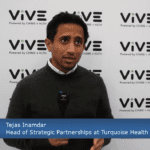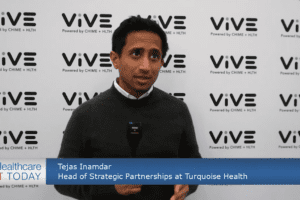Welcome to our Healthcare IT Today Weekly Roundup. Each week, we’ll be providing a look back at the articles we posted and why they’re important to the healthcare IT community. We hope this gives you a chance to catch up on anything you may have missed during the week.
Learning From the Experts at ViVE 2023. Not surprisingly, John Lynn and Colin Hung had a full schedule down in Nashville. This set of interviews with leaders at KeyBank, Clarify Health, Esri, and Xealth focused on managing patient payments, using data to improve price transparency, using GIS technology to improve EMS response, and more effectively managing third-party vendors. Read more…
Discussing Data at ViVE 2023. John and Colin also had a lot of conversations about data. Hear what they learned from leaders at Divurgent, XSOLIS, Clinical Architecture, and Interlace Health about how effective data management leads to better patient outcomes, more efficient processes, happier staff, and improved payer / provider alignment. Read more…
Using Technology to Address Medication Access. In the first post in a four-part series, one health IT expert told Andy Oram that only 25% of patients are “even mostly adherent” to medications as prescribed. High costs are certainly a concern – but so is the uncertainty that medications will be available, which stems from an information disconnect between the doctor’s office and the pharmacy. Read more…
Helping People Take Their Medications. As a way to improve adherence, digital health tools offer reminders, leverage remote patient monitoring, and connect patients with clinicians or caregivers. Andy explored several options on the market and looked at how they give providers critical insight into whether patients are in fact taking their medication. Read more…
Understanding What Goes Wrong With Medication Adherence. Andy then indicated two scenarios when adherence often falls apart. One is when notifications get annoying and don’t account for what else is happening in a patient’s life. The other is when patients get prescriptions at hospital discharge, since they’re often tired and overwhelmed as new medications are being explained to them. Read more…
Rethinking Medication and Information Technology. Andy concluded his excellent series by looking at medication adherence in the context of self-management, collaborative care, and alternatives to prescription drugs. The challenge is having a conversation with a doctor about these options in care models that don’t leave much time to talk. Read more…
Diving Deep Into Experience Management. For the latest version of the Healthcare IT Podcast, John and Colin got together to discuss what healthcare can learn about experience management from other industries. The conversation touched on both the patient and the employee experience. Read more…
Nuance Announces Fully Automated Creation of Doctor’s Notes. Diana Nole at Nuance Healthcare gave John the lowdown on DAX Express, which will be released later this year and integrate with parent company Microsoft’s GPT-4. The main benefit? Fully automated clinical documentation means no humans are needed to review notes. Read more…
Bidding Farewell to the #HITsm Chat. After nearly 13 years and 561 Twitter chats, the #HITsm fittingly ended with a preview of #HIMSS23, where many members of the community met in person for the very first time. Don’t worry – the #HITsm hashtag will live on, and we haven’t ruled out the possibility of occasional chats on the future. Read more…
Protecting Healthcare Organizations in the Era of Edge Computing. As care moves beyond the walls of the hospitals, organizations are rolling out uninterruptible power supplies to protect against downtime and data loss offsite. James Martin at Eaton discussed how to keep connected power supplies secure amid ever-present cybersecurity threats. Read more…
Expanding Healthcare Access to Patients With Limited English Proficiency. When patients don’t speak the same language as their providers, they have poorer outcomes. Nic McMahon at United Language Group noted how video, machine learning, and other technology can efficiently provide interpretation services and improve care for non-English speakers. Read more…
Accelerating Personalized Health With Digital Twins. A digital twin is a replica of a physical system that gets fed data from sensors and uses that data to identify trends and predict problems. Steve Lazer at Dell Technologies described how digital twins can help companies conduct clinical trials faster and brings approved products to market sooner. Read more…
Tackling the Rising Tide of Staff Shortages. Healthcare is struggling to fill both clinical and administrative jobs. Roni Jamesmeyer at Five9 talked about the role of conversational AI in routing incoming phone calls and authenticating users as a way to save time, reduce errors, and make services available 24/7. Read more…
Featured Health IT Job: Vice President, Compliance and Program Development at Easterseals Louisiana posted to Healthcare IT Central.
Funding and M&A Activity:
- Inato closed $20 million in Series A2 funding; the company focuses on making clinical trials more inclusive.
- Value-based care platform Wellvana closed an $84 million capital raise.
- Digital experience startup Florence emerged from stealth with a $20 million seed funding round.
Thanks for reading and be sure to check out our latest Healthcare IT Today Weekly Roundups.













